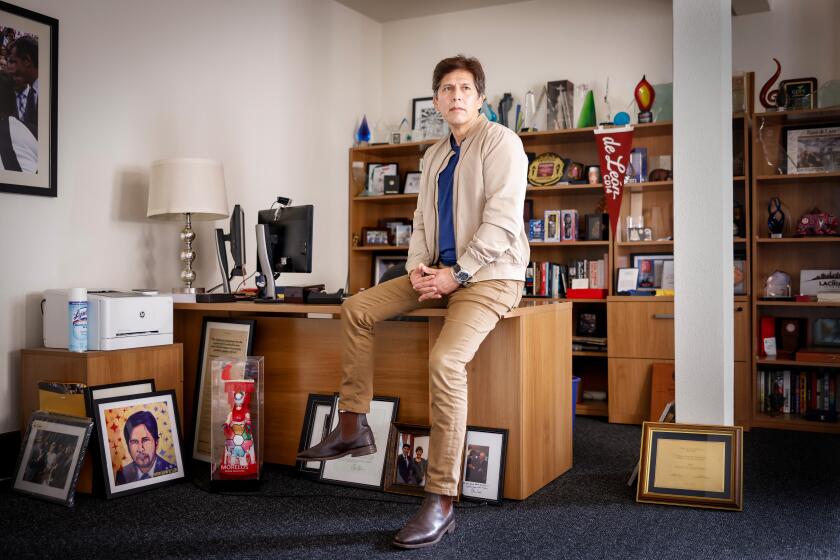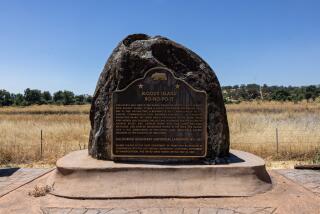Kevin de León seeks to rename Pershing Square for Biddy Mason, ex-slave and unsung L.A. hero
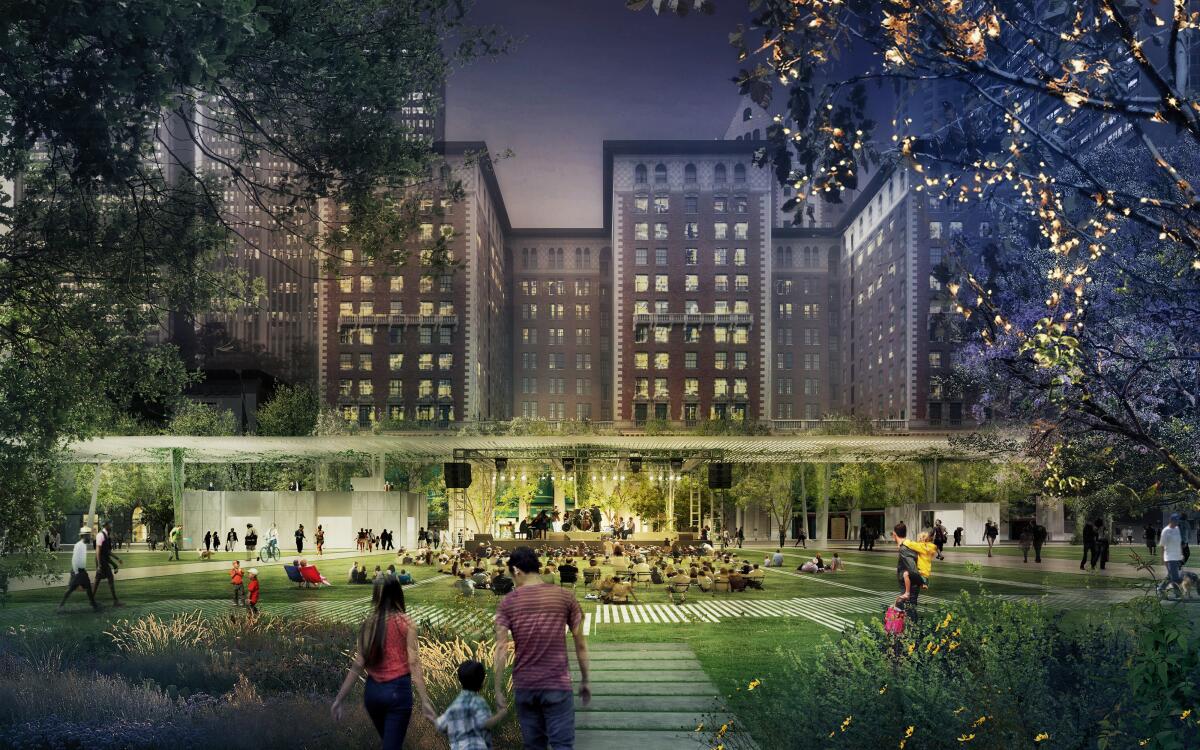
- Share via
It was nearly a year ago that Los Angeles City Councilmember Kevin de León celebrated the start of a multimillion-dollar renovation of Pershing Square in downtown L.A.
The ceremony marked the beginning of the park’s transformation, with construction crews expected to turn the concrete space into a more accessible and attractive public square by demolishing walls, lowering the park to street level and adding greenery.
Now, the 5-acre park, nestled between Olive and Hill streets, will get not only a new look but also, quite possibly, a new identity.
On Wednesday, De León announced he intends to rename Pershing Square after Biddy Mason, who was born into slavery and won her freedom in court and became a philanthropist and unsung hero of Los Angeles, founding the city’s First African Methodist Episcopal Church, one of the largest Black churches in the U.S.
De León unveiled his plans on Juneteenth, the federal holiday marking the date in 1865 when Union soldiers informed the last enslaved people in Galveston, Texas, that they were free. It also comes as De León faces a tough reelection campaign, and is looking to move past a nearly two-year-old scandal over his participation in a secretly recorded conversation that featured racist and derogatory remarks.
Since then, De León has apologized to the Black community and the city as a whole. Standing in Pershing Square, he dismissed the idea that the proposal is linked to the scandal or his re-election, saying he has had talks with Biddy Mason’s descendants about ways of honoring her since February 2022.
“This is a recognition of an incredible woman who was a huge, huge property owner in downtown Los Angeles, a woman who fought courageously to secure her freedom in a court of law in Los Angeles,” he said an interview. Renaming Pershing Square will be “a true reflection of who she is, and the impact that she has had in downtown Los Angeles.”
The park is currently named after military hero Gen. John J. Pershing, who commanded the U.S. armed forces during World War I and was awarded General of the Armies, the highest military rank in the U.S.
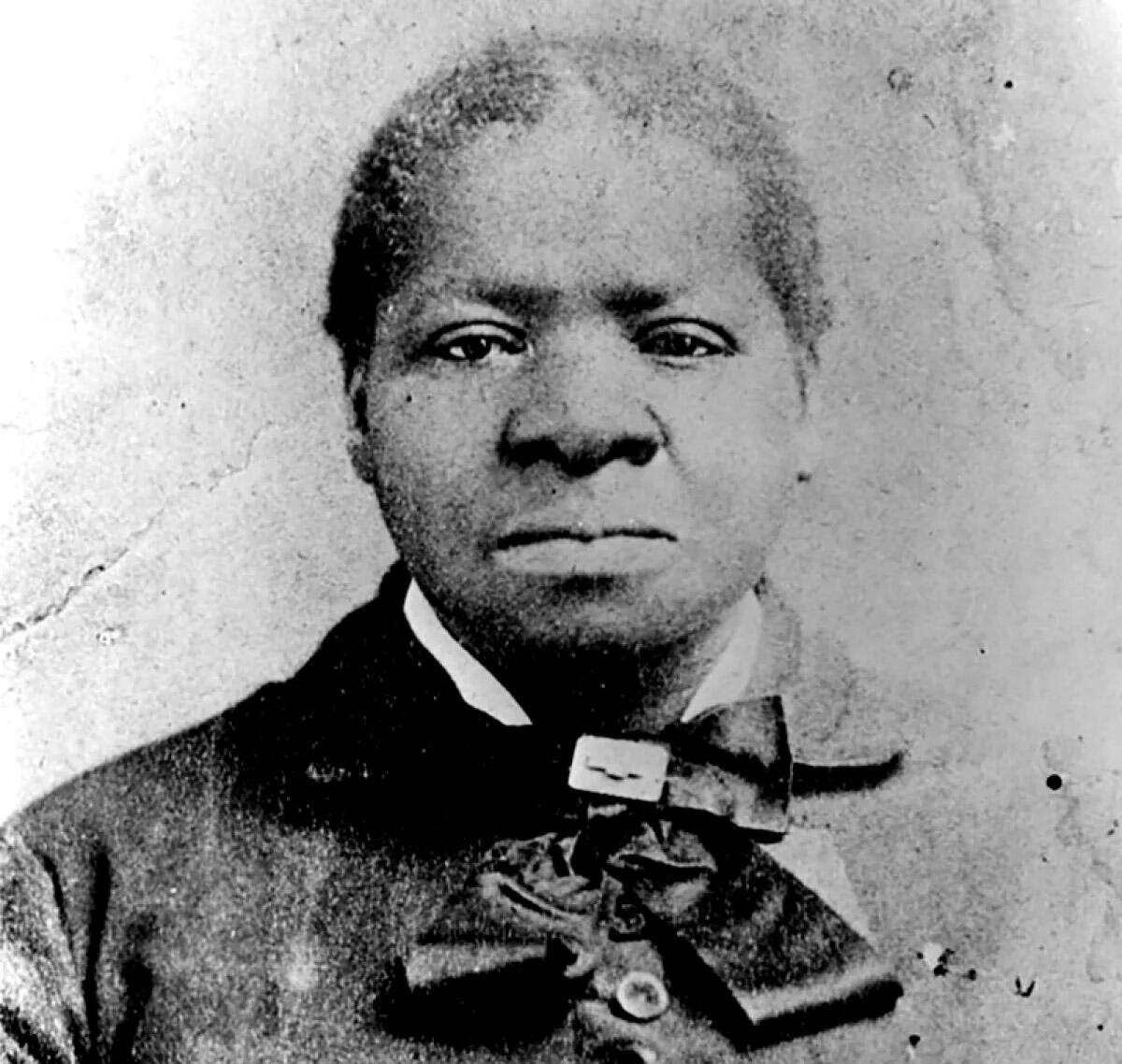
De León said he is confident his colleagues will vote to support the park renaming. He also plans to submit a separate motion to add a ceremonial street sign on Spring Street, between 1st and 5th streets, to honor her.
The proposal to rename Pershing Square was welcomed by Cheryl Cox, one of Mason’s great-great-great-great-granddaughters. Mason accomplished “remarkable feats” that, during the 19th century, were “unprecedented for people of color, let alone a woman born into slavery in 1818,” Cox said.
After securing her freedom, Mason amassed extensive property holdings in Los Angeles, helping the needy both in her role as a businesswoman and as a philanthropist.
“She is an American story, an American heroine, and she deserves all the honors that can be bestowed on her,” said Cox, standing in front of a small audience at Pershing Square.
Cox said the park renaming would elevate the city’s understanding of Mason at a time when few parks are named for women or people of color.
“Having something like a park that is historic, and was around when she was alive and has been a central part of the city, is a great step in the right direction for her receiving the recognition for what she has done,” said Cox’s sister, UC Riverside professor Robynn Cox.
Nick Griffin, executive vice president of DTLA Alliance, a coalition of more than 2,000 property owners, said his group is also thrilled with the park’s proposed name change.
“I think tapping into the powerful legacy [of] Biddy Mason is almost a perfect fit for the revitalization of a park that has also been to some extent forgotten over the years,” he said. “I think both the park and her legacy will benefit from a rediscovery.”
Pastor Stephen “Cue” Jn-Marie, who is based in Skid Row, was troubled by the announcement, calling it “another example of people using Black folks for political gain.” Jn-Marie, who called for De León resignation two years ago, said he would support the park renaming — as long as De León is not involved.
“It just seems like Kevin de León is trying to save his career at this point,” he said.
Mason was born into slavery in the Deep South in the summer of 1818. At a young age, she was sold and purchased by enslavers, developing skills in herbal medicine and midwifery.
At 18, she and her sister were sold to Mississippi plantation owner Robert Smith. In 1847, Smith converted to Mormonism and relocated his family to Utah to help establish a Mormon community. Mason walked behind a 300-wagon caravan for months, cooking and herding cattle while caring for the Smiths’ children as well as three of her own, including an infant.
In 1851, the Smiths relocated from Utah to San Bernardino. By then, California had been admitted to the Union, and slavery was illegal. Eventually, Mason fought for her freedom in court, with the judge ruling in her favor and that of Smith’s other slaves.
Kevin de León is the last one standing after an audio leak caught him in a conversation that featured racist and derogatory remarks. Now he’s running for reelection.
Her case was one of the first legal challenges to slavery in Los Angeles and set a precedent for others to petition for their freedom in California.
Mason then went to work as a nurse and midwife, saving $2.50 a day until she had enough to buy land between Broadway and Spring Street, where she built her home.
She continued to purchase real estate throughout the city. By 1878, Mason had become a wealthy landowner, eventually selling some of her properties for as much as 10 times their original price.
Her philanthropy grew alongside her wealth. She was known to pay the annual property taxes for local churches. She started First AME out of her home. She also built the first school and foster home for Black children. In 1884, when a storm caused the Los Angeles River to swell and sweep away homes, Mason paid a grocery store to give away food to flood victims, regardless of color. She helped so many people that she was fondly referred to as “Aunty” or “Grandma Mason.”
Mason died in 1891 and was soon forgotten. Then in 1988, First AME placed a headstone on her unmarked grave at Evergreen Cemetery. The following year, a walkway off of Spring and 3rd Streets in downtown was erected in her honor.
De León said he viewed that area as dark and secluded — and an insufficient way of honoring Mason’s accomplishments.
Cheryl and Robynn Cox said they had long tried to get a street renamed after their ancestor, with no luck. Two years ago, they approached De León and his team with their request. They don’t recall when conversations shifted to Pershing Square.
Cheryl Cox and her sister said they couldn’t speak to De León’s motives.
“We want to keep the focus just on our grandmother,” Robynn Cox said.
“We don’t condone what was said and what was not said” in the audio leak featuring De León, Cheryl Cox said. “But it should not in any way disparage from our grandmother, nor her legacy, nor what the city should be doing for her.”
De León, for his part, said the park renaming is only his latest effort to recognize Angelenos — especially people of color — who have made contributions to the city.
“Cynical eyes will always be around,” he said. “You can’t change cynical.”
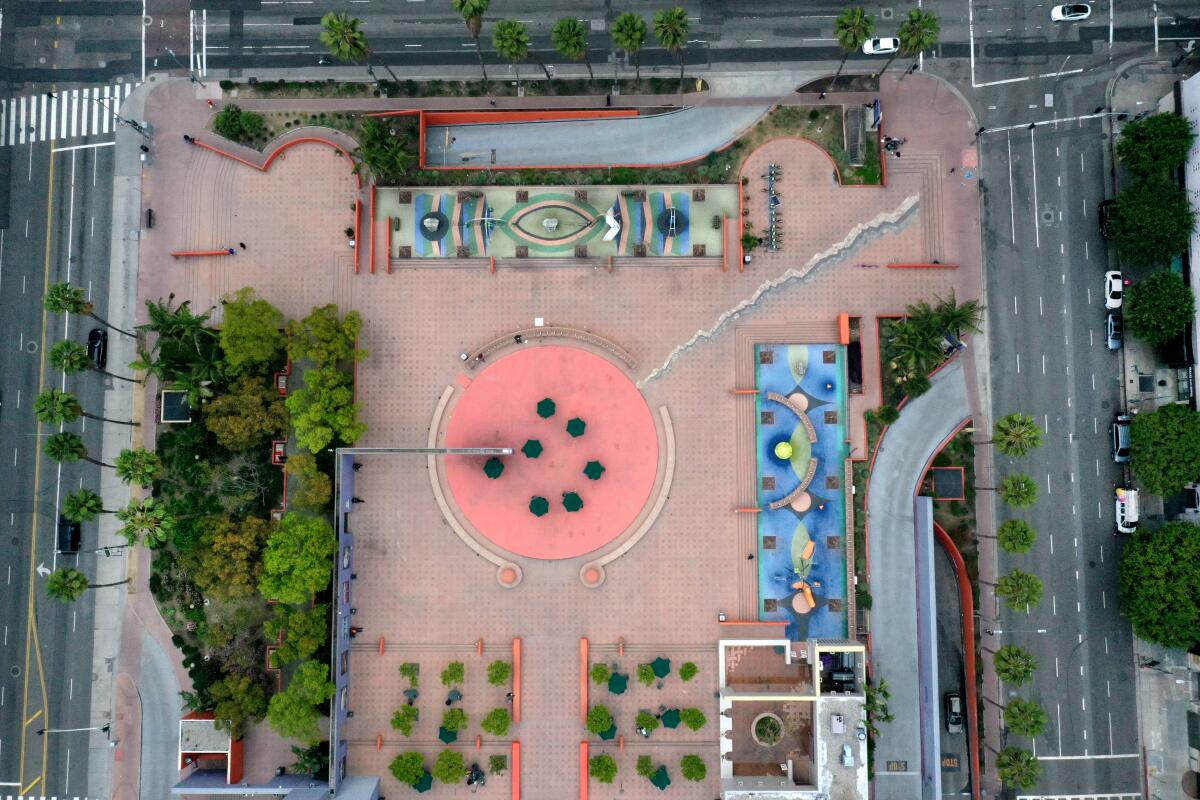
On a recent afternoon, there were few visitors at Pershing Square. Amid the din of traffic, hissing buses and loud stereos, the playground sat empty, and men lay on the grassy strips, napping under the sun. Along the square’s pathways, homeless people took up what few shaded areas were available; some used drugs openly.
“It’s not very people-friendly. There’s no shade,” said Gayle Baigelman, 63, as she walked her gray pit bull, Hope. “And you can see who is usually drawn to this place.”
She said she’d heard about the park’s renovation and was looking forward to the transformation. She also approved of the proposed renaming.
“That’s definitely the right person to honor.”
More to Read
Sign up for Essential California
The most important California stories and recommendations in your inbox every morning.
You may occasionally receive promotional content from the Los Angeles Times.
